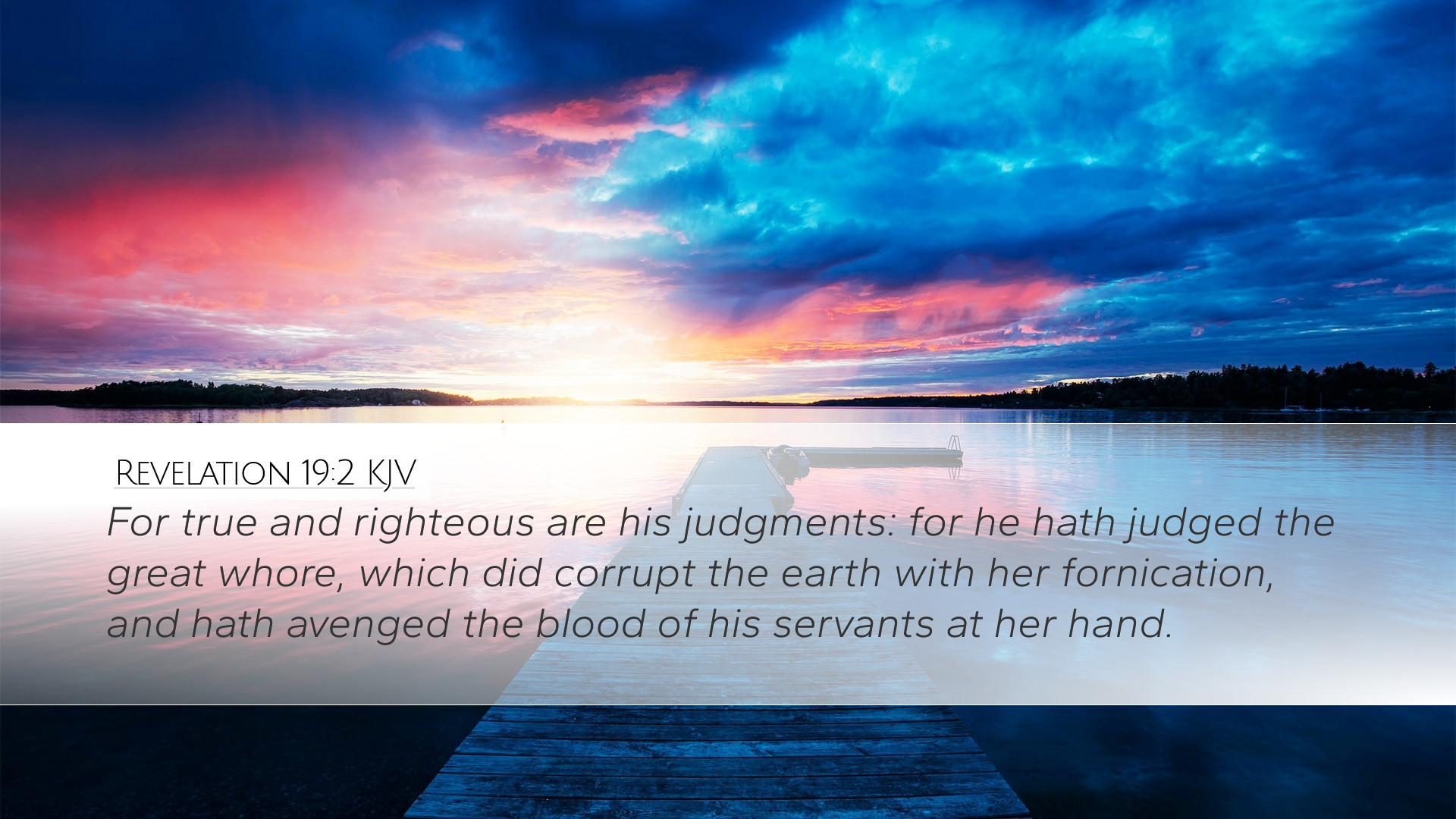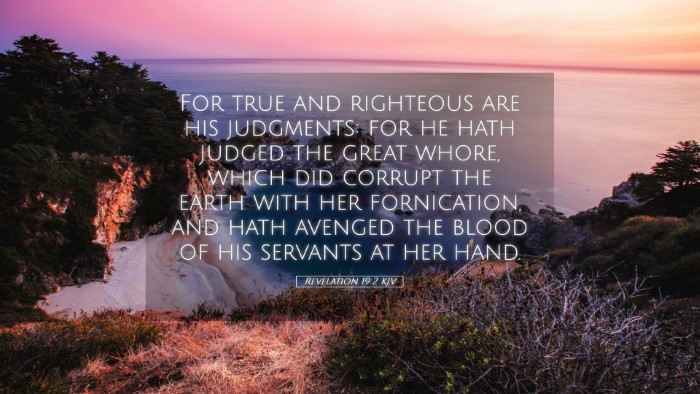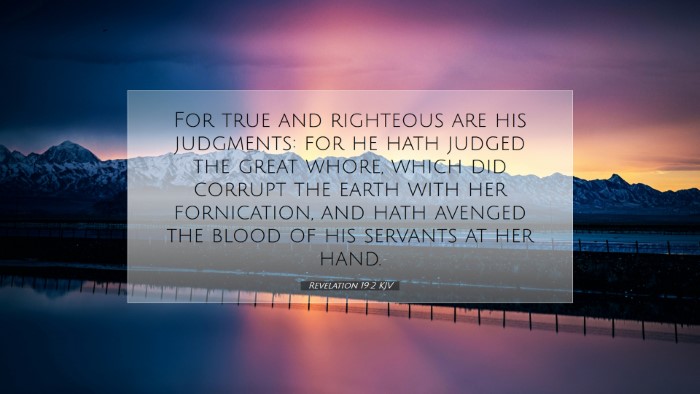Commentary on Revelation 19:2
Verse Citation: Revelation 19:2 - "For true and righteous are his judgments; for he hath judged the great whore, which did corrupt the earth with her fornication, and hath avenged the blood of his servants at her hand."
Introduction
This verse from Revelation encapsulates the divine justice of God and His responses to human immorality. In the context of apocalyptic literature, the imagery utilized presents a powerful proclamation regarding the judgment of the corrupt system symbolized as the "great whore." This commentary will synthesize insights from renowned public domain biblical commentaries to explore its theological implications and applications for contemporary audiences.
Overall Theme of Revelation 19:2
At the core of Revelation 19:2 is the theme of divine retribution and the vindication of God's faithful servants. The juxtaposition of God's righteousness against the backdrop of corrupt practices serves as a critical reminder of the ultimate accountability that awaits all of humanity.
Insights from Matthew Henry
Matthew Henry emphasizes the certainty and righteousness of God’s judgments. He asserts that "God’s judgments are true and just, and they are grounded in reality and not mere opinion." The phrase "the great whore" is indicative of apostasy and moral corruption within religious systems that lead people away from the truth. Henry notes that God’s judgment serves both to punish those who have led others astray and to protect the integrity of His covenant people.
- Judgment on Corruption: Henry highlights that the "great whore" represents a system that corrupts the earth and engages in spiritual infidelity, suggesting a broader critique of institutions that intermingle secular and sacred.
- Avenge of the Martyrs: The vengeance upon "the blood of his servants" indicates God's commitment to justice for His people, aligning with the overarching theme of salvation and retribution in the redemptive narrative.
Insights from Albert Barnes
Albert Barnes takes an exegetical approach to the passage, unpacking the implications of God's character reflected in His judgments. He posits that "the true and righteous nature of God ensures that all His actions are driven by moral rectitude." Barnes elaborates on the severity of divine judgment, not just as a reactionary measure but as a foreordained part of God’s sovereign plan.
- The Nature of Divine Justice: Barnes notes that God's judgments are not whimsical but are executed according to divine truth, showing His integrity and faithfulness to His covenant.
- Symbolism of "the great whore": He explains that this imagery is used to represent Babylon – the epitome of human pride and rebellion against God, emphasizing the consequences of such arrogance.
Insights from Adam Clarke
Adam Clarke provides a thorough examination of the sociohistorical context of this verse. He discusses the implications of idolatrous practices prevalent at the time of the early church and correlates these to contemporary issues. Clarke states, "The judgments pronounced here demonstrate God's intolerance for idolatry and moral decay." He connects the passage to the hope offered to the faithful through the promise of justice.
- Consequences of Idolatry: Clarke emphasizes that the destruction of the "great whore" is a metaphor for the ultimate fall of corrupt societal and religious structures that mislead God's people.
- The Vindication of the Righteous: Clarke also points out that the avenging of blood shows God’s commitment to justice, providing comfort to the oppressed, and hope for ultimate justice in God’s timing.
Theological Implications
The examination of Revelation 19:2 through these commentaries highlights crucial theological implications:
- Divine Justice: The passage affirms the belief that God is just and will hold all forms of corruption accountable, a central tenet in Christian theology.
- Hope for the Persecuted: For those enduring trials for their faith, this passage assures them of God's eventual justice and their vindication.
- Call to Righteousness: The verse is a reminder to believers to live lives of integrity and faithfulness, rejecting the temptations of the "great whore" in modern contexts.
Applications for Modern Readers
For pastors, students, theologians, and scholars, the reflections on Revelation 19:2 provide a rich ground for both personal and communal application:
- Examination of Cultural Practices: Readers are encouraged to critically assess cultural influences that may lead to spiritual compromise.
- Encouragement in Suffering: This verse should serve as an encouragement to those facing persecution, reminding them of God's promise to avenge and protect.
- Commitment to Justice: The call to social and ethical responsibility is clear — believers are called to be advocates for justice within their communities.
Conclusion
Revelation 19:2 serves as a profound reminder of God's sovereignty and righteousness. Through insights from respected commentators like Matthew Henry, Albert Barnes, and Adam Clarke, we glean a deeper understanding of God's nature and the essential call to holiness in light of divine judgment. The judgment against the "great whore" not only illustrates God’s righteous retribution but also empowers believers to uphold truth and justice in their lives. Thus, this verse stands as both a warning and a source of hope, urging the faithful to remain steadfast in an increasingly corrupt world.


